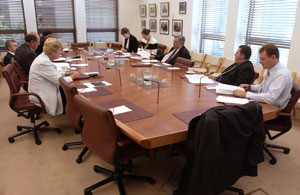General committee provisions
36 Public and private meetings
Persons other than members and officers of a committee may attend a public meeting of a committee but shall not attend a private meeting except by express invitation of the committee, and shall always be excluded when the committee is deliberating.
Amendment history
Adopted: 19 August 1903 as SOs 297 to 299 but renumbered as SOs 293 to 295 for the first printed edition.
1989 revision: Old SOs 305 to 307 combined into one and renumbered as SO 36; repositioned from old chapter XXII on select committees; rephrased to clarify right of any person to attend a public meeting and for committees to be able to invite persons to attend private meetings other than deliberative meetings
Commentary

A private meeting of the Committee of Privileges in 2004 (Photo courtesy of AUSPIC)
Preserved in much the same form since its adoption in 1903, SO 36 was rephrased in the 1989 revision to reflect long-standing practice that any person could attend a public meeting of a committee and that their attendance was not at the discretion of the chair or any member. The practice of committees inviting persons to attend private meetings was also formalised but the exclusion of all persons other than members and committee staff from deliberative (or decision-making) meetings was reaffirmed. Committees, particularly those without the power to meet in public, have frequently found it useful to invite persons to private meetings, for example, for the purpose of briefing the committee about matters of interest. “Officers of a committee” means the staff employed by the Department of the Senate to provide secretariat services to a committee, and any specialist advisers engaged by the committee, such as the legal advisers to the legislative scrutiny committees. It does not include the personal staff of individual committee members.
The changes effected by the 1989 revision also covered matters that had been dealt with in old SOs 306 and 307 relating to the attendance at public meetings of senators who were not members of a committee, subject to the discretion of the chair or any member, and to their exclusion from deliberative or secret meetings.[1]